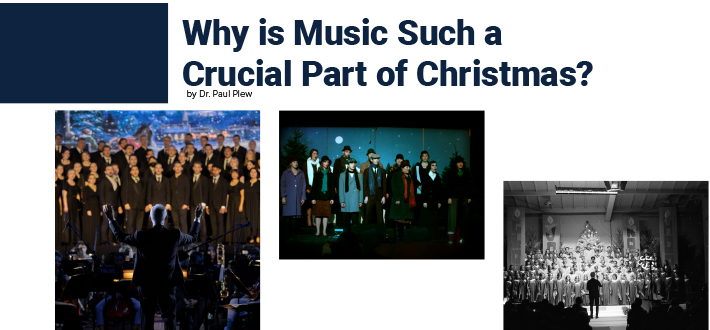FAITH
Why is Music Such a Crucial Part of Christmas?
December, 2022 - Issue #216
 |
LEFT: Dr. Paul Plew, center, led the music department at The Master's University from 1979 to 2022. He continues to lead the school's choirs. CENTER: TMU's Come Christmas Sing! Concerts started nearly four decades ago. This one was in 2011. RIGHT: Down through the centuries, music has always been a central part of Christmas; that's certainly been true at Master's since the school's founding in 1927.
It all started on the Judean hillside in Luke 2. The angel of the Lord said, "I proclaim to you good news of great joy that will be for all the people." Suddenly, there was a multitude of angels proclaiming, "Glory to God in the highest, and on earth peace to men with whom He is pleased."
That was the first Christmas proclamation. The sky was filled with thousands and thousands of angels making sounds that I believe went far beyond the beauty of what we call music. Since then, there have been many more occasions of celebrating Christmas through the making of joyful noises. There are many Christmas carols that date back hundreds of years. Let me list a few:
"Of the Father's Love Begotten" dates back to Aurelius Clemens Prudentius in the fourth century. He wrote it for his own personal devotional use.
"O Come, O Come, Emmanuel" was written in the seventh century in Latin. It was translated by John Mason Neale into English in 1851.
One of my favorites of those translated from Latin is
"O Come, All Ye Faithful."
Of course, there are carols still being written today. A couple I will mention are "Joy Has Dawned Upon the World" by Keith Getty and Stuart Townend, and "Exult in the Savior's Birth" by Matt Boswell and D.A. Carson.
So why through the centuries, and all the way down to today, has there existed such a strong connection between music and Christmas?
For one thing, everyone loves Christmas. We love the music associated with it, both sacred and secular. Music reminds us of family gatherings. We think of our children when they were small. We think of the times around the Christmas tree singing carols and reading the Christmas story.
At what other time of year do you see people gather together and go singing house to house? I loved getting family, friends and alumni of The Master's University together to go out and sing carols. Music brought us together and the music was tied to strong biblical texts that spoke of the most important event in history... the birth of our Savior.
Folks, people all around the world sing the gospel at Christmas. Some of the lyrics that leave people's mouths include:
"This, this is Christ the king"
"Christ was born to save"
"From our sins and fears release us, let us find
our rest in Thee"
"Peace on earth and mercy mild, God and
sinners reconciled"
There are people who seldom sing, but they always sing at Christmas. There are people who seldom go to church, but they often go at Christmas. Also, there are people who seldom go to concerts but often go at Christmas.
That is why we started our Come Christmas Sing! Concerts series 38 years ago. We feature all of the musical groups on campus, including the University Orchestra, University Singers, Master's Chorale, handbells, ensembles and soloists. We also join with the audience in singing "The 12 Days of Christmas" and our annual Christmas Carol Sing. We also sing a major oratorio with an orchestra, which allows our students to sing and play great art from the heart. We do this because we want everyone to experience the wonder of music at Christmas and the strong gospel message it shares.
So why is music such an important part of Christmas? You could say, Christmas started with a song; it shares the greatest news ever told; it brings family, friends and community together; it brings back memories of loved ones, precious experiences and opportunities; it connects us to the past, which is often forgotten; and music also helps us think of the future. Since He came the first time, He will come again.
Dr. Paul Plew led the School of Music at The Master's University from 1979 to 2022. He continues to direct the school's choirs.
|
||||||||||||||||||||||||||||





